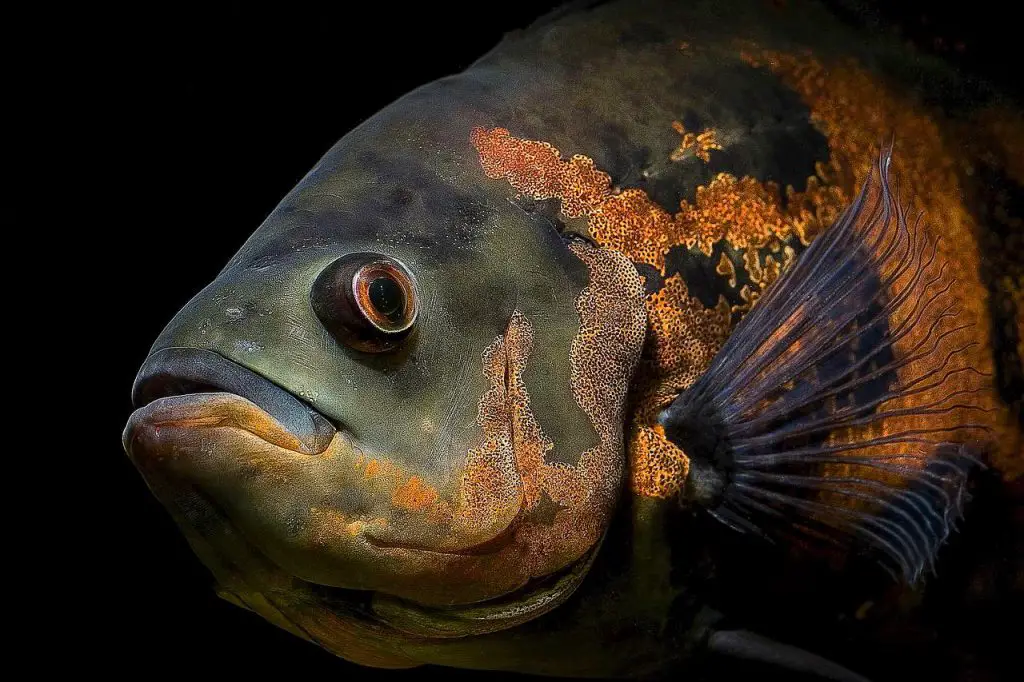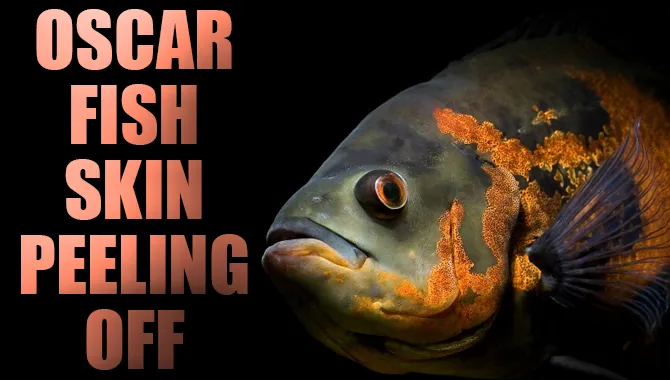Oscars are one of the most popular freshwater centerpiece fish around, and for good reason. They are beautiful, smart, friendly to their owners, and full of personality. Owners of Oscar fish often feel like they have formed a real bond with their fishy friend, which can cause a lot of heartache when you notice they are sick.
One of the most frightening things that can happen to your Oscar is their scales or skin peeling off. This frightening disorder can be caused by a lot of different things, but there are a few reasons that are more common than others.
An Oscar can have skin that is peeling off because of an ammonia spike, ich, velvet, or physical injury.
Let’s look a little deeper into Oscar’s and their skin issues!
Why Is Oscar Fish Skin Peeling Off?
Any pet that has an issue that is causing skin to peel can be disturbing, but with pets like fish that you can’t hold and examine, it can be even harder to determine the cause. In this article, we’ll investigate some of the most common causes for Oscar skin peeling.
Uncycled Tank or Ammonia Spike
Having a cycled aquarium before adding fish is important for their health. Before a tank is properly cycled, the water is full of harmful ammonia and nitrites. Ammonia especially can wreak havoc on an Oscar’s skin, causing something called ammonia burn.
Ammonia burns are caused by excess ammonia in the Oscar’s tank, and appear as red, open wounds on Oscar’s skin with the skin around it peeling. The ammonia burn will turn black as it heals.
If your Oscar is suffering skin issues because of ammonia, move it to a different tank with clean water to heal.
Ich
Ichthyophthirius multifiliis, also known as white spot disease or more commonly, ich, is a parasite that causes white spots on your Oscar’s fins and skin that can eventually be fatal.
These white spots are actually the parasites themselves burrowing into your Oscar’s body and wreaking havoc. Ich can cause peeling skin, open wounds, and blisters.
Velvet
Velvet is another parasite that can harm your Oscar’s skin, covering it in a thick layer of gold dust or “Velvet” that is actually thousands of the tiny parasites burrowing into your fish’s skin.
Piscinoodinium pillulare, more commonly known as velvet, doesn’t affect Oscar’s as often as it does other fish, but it is still a risk to consider. Like ich, velvet can spread rapidly through an aquarium, causing widespread illness and death.
Besides the velvet-like parasite on the skin, velvet also causes respiratory distress and skin degradation.
Physical Injury

As long as the injury isn’t too dire, a physical injury is usually the best case scenario for an Oscar’s skin peeling.
Oscars are curious fish, and like to shove themselves into places they don’t belong. This investigative nature can cause skin scrapes and injuries aplenty, and upon first glance, these injuries can appear to be your Oscar’s skin peeling away.
Injuries can peel skin off, but these injuries should heal under the right conditions. Clean water, and possibly mediation to prevent infection or fungal growth on the physical injury, can go a long way towards making you Oscar better again.
What Causes Ich on Oscars?
Ich is caused by a parasite known as Ichthyophthirius multifiliis, which can be picked up from other fish at a pet store, poor sanitation, or a compromised immune system.
Once 1 fish in a tank has ich, it’s likely the entire tank will need to be treated. Ich spreads extremely fast, and if not treated, can be deadly.
Luckily there are many treatment options, ranging from simply raising the temperature in your tank to liquid medications that can be added to the tank water.
How Do You Treat Ich in Oscar Fish?
Ichthyophthirius multifiliis, also known as ich, can be treated by a few different means. Raising a tanks temperatures to 86°F (30°C), natural remedies like garlic, and medications like Ich-X can all treat ich to different degrees based on the severity of the infection.
Gentler methods of ich treatment can be used if the parasite is caught early enough, but once ich has affected the entire tank, you’ll probably need to use actual medication to get rid of all of the ich for good.
Does My Oscar Fish Have Disease?
It’s difficult to tell just from sight alone whether your Oscar has a disease or not, but keeping an eye out for certain symptoms can make these diagnoses easier.
Changes in color, skin appearance, weakness or listlessness, problems swimming, and flashing are all signs something might be wrong with your Oscar.
Not all diseases require the same treatments, so if you are a new Oscar owner, it’s a good idea to do some research on common Oscar diseases and how they present. Knowing exactly what is wrong with your Oscar will help you treat them correctly the first time around.
Preventing Infections
Preventing infections in Oscars all comes down to tank cleanliness and safety.
The biggest culprit of infections and other illnesses popping up in Oscars in an established tank are new fish being added without being quarantined. Quarantine is the single most important thing you can do to maintain tank healthiness.
New fish should be quarantined for 4 to 6 weeks, and if they display signs of illness, make sure they are fully healed before restarting the quarantine. Time that the fish is sick should not be counted towards quarantine.
Fin and Tail Rot (Columnaris Disease)
Columnaris, also known as fin and tail rot, is a bacterial infection that commonly infects guppies and livebearers, but can also infect Oscars, especially those living with other susceptible fish.
Columnaris appears as patches on the fish’s skin, either white or red, and can sometimes appear to be raised or to be peeling the skin away. Columnaris has to be treated with antibiotics since there aren’t any natural remedies for the disease.
As the name suggests, fin and tail rot will quickly eat away at the delicate fin and tail flesh of the fish, which is why quick treatment is so imperative.


